Related Research Articles

The Tower of London, officially His Majesty's Royal Palace and Fortress of the Tower of London, is a historic castle on the north bank of the River Thames in central London, England. It lies within the London Borough of Tower Hamlets, which is separated from the eastern edge of the square mile of the City of London by the open space known as Tower Hill. It was founded toward the end of 1066 as part of the Norman Conquest. The White Tower, which gives the entire castle its name, was built by William the Conqueror in 1078 and was initially a resented symbol of oppression, inflicted upon London by the new Norman ruling class. The castle was also used as a prison from 1100 until 1952, although that was not its primary purpose. A grand palace early in its history, it served as a royal residence. As a whole, the Tower is a complex of several buildings set within two concentric rings of defensive walls and a moat. There were several phases of expansion, mainly under kings Richard I, Henry III, and Edward I in the 12th and 13th centuries. The general layout established by the late 13th century remains despite later activity on the site.
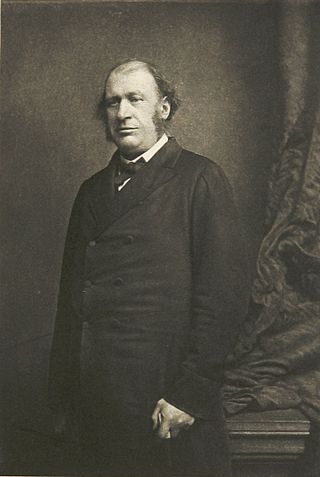
Sir James Fitzjames Stephen, 1st Baronet, KCSI was an English lawyer, judge, writer, and philosopher. One of the most famous critics of John Stuart Mill, Stephen achieved prominence as a philosopher, law reformer, and writer.

Sir Elijah Impey was a British judge who served as the first chief justice of the Supreme Court of Judicature at Fort William in Bengal, Chief Justice of the Sadr Diwani Adalat and Member of Parliament for New Romney.

William Coxe was an English historian and priest who served as a travelling companion and tutor to nobility from 1771 to 1786. He wrote numerous historical works and travel chronicles. Ordained a deacon in 1771, he served as a rector and then archdeacon of Bemerton near Salisbury from 1786 until his death.

Thomas Thynne, 1st Marquess of Bath, KG, PC, of Longleat in Wiltshire, was a British politician who held office under King George III. He served as Southern Secretary, Northern Secretary and Lord Lieutenant of Ireland. Between 1751 and 1789, he was known as the 3rd Viscount Weymouth. He is possibly best known for his role in the Falklands Crisis of 1770.

William King was a British physician and philanthropist from Brighton. He is best known as an early supporter of the co-operative movement through the paper he founded, The Co-operator.

John Shore, 1st Baron Teignmouth was a British official of the East India Company who served as Governor-General of Bengal from 1793 to 1798. In 1798 he was created Baron Teignmouth in the Peerage of Ireland. Shore was the first president of the British and Foreign Bible Society. A close friend of the orientalist Sir William Jones (1746–1794), Shore edited a memoir of Jones's life in 1804, containing many of Jones's letters.
John Parker may refer to:
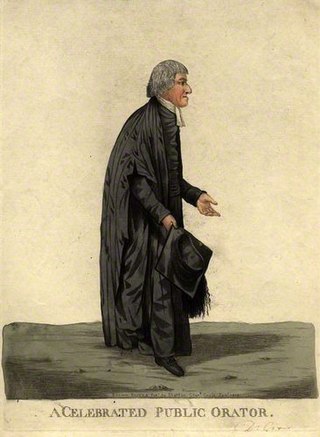
William Crowe (1745–1829) was an English poet, the son of a carpenter and educated as a foundationer at Winchester College. He went to Oxford, where he became public orator.
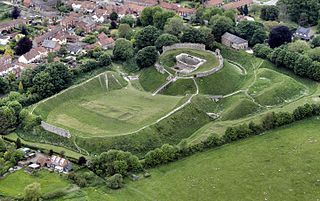
Castle Acre Castle and town walls are a set of ruined medieval defences built in the village of Castle Acre, Norfolk. The castle was built soon after the Norman Conquest by William de Warenne, the Earl of Surrey, at the intersection of the River Nar and the Peddars Way. William constructed a motte-and-bailey castle during the 1070s, protected by large earthwork ramparts, with a large country house in the centre of the motte. Soon after, a small community of Cluniac monks were given the castle's chapel in the outer bailey; under William, the second earl, the order was given land and estates to establish Castle Acre Priory alongside the castle. A deer park was created nearby for hunting.
In English ecclesiastical law, the term incumbent refers to the holder of a Church of England parochial charge or benefice. The term "benefice" originally denoted a grant of land for life in return for services. In church law, the duties were spiritual ("spiritualities") and some form of assets to generate revenue were permanently linked to the duties to ensure the support of the office holder. Historically, once in possession of the benefice, the holder had lifelong tenure unless he failed to provide the required minimum of spiritual services or committed a moral offence. With the passing of the "Pastoral Measure 1968" and subsequent legislation, this no longer applies, and many ancient benefices have been joined into a single new one.
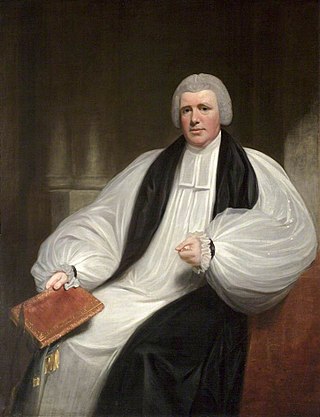
George Henry Law was the Bishop of Chester (1812) and then, from 1824, Bishop of Bath and Wells.
Impey may refer to:

Philip Bliss was a British book collector who served as Registrar of the University of Oxford from 1824 to 1853, and as Principal of St Mary Hall, Oxford, from 1848 until his death.
Sir John Eliot, 1st Baronet was a Scottish physician and Physician to the Prince of Wales.
The Dick baronetcy in Prestonfield, Edinburgh was created in the Baronetage of Nova Scotia for James Dick. Initially created in 1677, it was renewed in 1707 and merged with the Cunningham of Lambrughton, Ayrshire baronetcy in 1829. The family seat was Prestonfield House, Edinburgh. Sir William Dick, 2nd Baronet and Sir Alexander Dick, 3rd Baronet were the younger sons of Sir William Cunningham, 2nd Baronet and his wife Janet Dick, the daughter and heiress of Sir James Dick, 1st Baronet. Both brothers changed their surname to Dick on inheriting Prestonfield in turn.
A rector is, in an ecclesiastical sense, a cleric who functions as an administrative leader in some Christian denominations. In contrast, a vicar is also a cleric but functions as an assistant and representative of an administrative leader.

Mary, Lady Impey was an English natural historian and patron of the arts in Bengal. The wife of Sir Elijah Impey, the Chief Justice of Bengal, she established a menagerie in Calcutta and commissioned Indian artists to paint the various creatures. Her paintings were later taken to England and were examined by John Latham who named several new species from them in his supplement to the General Synopsis of Birds (1787).
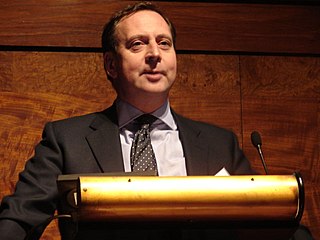
Edward Alexander Impey, is a British historian, archaeologist, and museum curator. Between October 2013 and January 2022 he was Master of the Armouries and Director General of the Royal Armouries.
References
- ↑ "Impey, John (d. 1829), legal writer" . Oxford Dictionary of National Biography (online ed.). Oxford University Press. doi:10.1093/ref:odnb/14372 . Retrieved 8 June 2020.(Subscription or UK public library membership required.)
- ↑ Faulkner, Thomas (1839). The History and Antiquities of the Parish of Hammersmith: Interspersed with Biographical Notices of Illustrious and Eminent Persons, who Have Been Born, Or who Have Resided in the Parish, During the Three Preceding Centuries. Nichols & Son. p. 361.